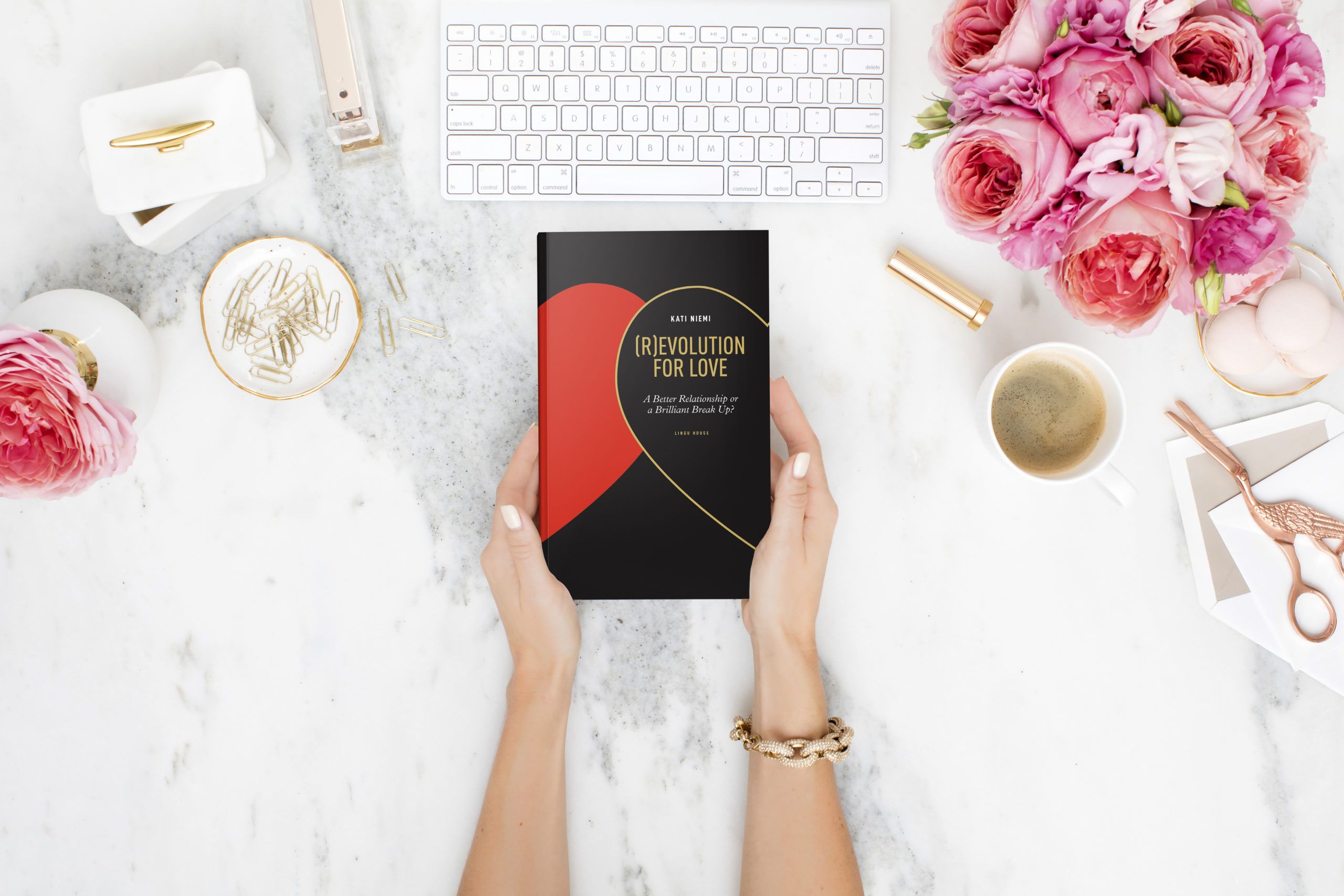It is quite common, and from a neuropsychological perspective, even natural, that it can be difficult to appreciate your ex. Sometimes your behaviour towards them can be even inappropriate. In this blog post, I’ll be discussing why appreciating your ex feels difficult. And how mutual respect between ex-partners could be improved.
How much bad behaviour should you tolerate from your ex?
The book (R)evolution for Love emphasises the importance of maintaining good relations with your ex even when it feels really difficult. The book provides tips for keeping calm and feel empowered before meetings with your ex. But how much rude behaviour should you tolerate from your ex?
Sometimes your ex’s behaviour may be simply out of order leaving you the only one taking responsibility for the communication. But you don’t have to put up with just anything. Drawing your boundaries is just as important as being respectful towards your ex. You don’t have to be your ex’s best friends or friend at ll. However, it is important to treat another person neutrally and without offending them. But how does mutual respect work. Especially if you were hurt by your ex during your relationship or the break up was painful?
Respecting a hurtful ex is difficult because our learnt, automatic stress response.
If you want to be able to be respectful towards your ex, you should first be aware of the automatic neuropsychological reaction that makes you behave negatively. Don’t be too hard yourself even if you lose your cool. However, do take a closer look at what happened and understand the logic (there is one!) behind your behaviour.

FREE EBOOK ‘I love you but…’ – To Break Up or Not to Break Up?
Refocus your energy now to improve your love life! This FREE ebook ‘I love you but…’ will help you move towards a better relationship or
Our brain is wiser than us, and we teach it with every new experience. It requires that we are aware of this process. Focus on what we can change in a moment that seems too tough to handle. Like meeting up with your annoying ex.
Our brain is plastic, which means that our synapses are constantly renewed. This is how we learn to react through our biologically and psychologically motivated automatic stress response towards a hurtful ex. In this light, behaving negatively towards an ex after a difficult relationship or painful break up is only logical. Our brain works in the best way available to it through these automatic responses. Unless we manage to stop our reactions, which originate in pain, in time.
The strongest emotional states causing pain are sometimes stored in our long-term memory very firmly. They obscure our ability to perceive new but similar situations neutrally and objectively.
We forget about being respectful towards our ex the second the automatic stress reaction kicks in.
While the pain experienced during a past relationship or a tormenting break up process remains unaddressed. The automatic stress response could keep on being activated during encounters with an ex afterwards. It is difficult to deal with the ex neutrally if automatic reaction of our “lizard brain” puts on the defensive. Even before our frontal lobe has a chance to intervene with some more reasonable behaviour.

Break up stories: real-life experiences and peer support
Experiences of breaking up. True divorce stories. Peer support for improving or ending your relationship. BOOK & BLOG.
This is a natural defence mechanism in all of us. An event that has harmed us in the past activates the amygdala which resides near the hippocampus, which in turn is central to our memory. The amygdala is responsible for the fight-or-flight response of our sympathetic nervous system.
Our bodies are very meticulous about storing strong experiences. That’s how we know to avoid a similar nasty experience in the future. Our brain automates our reactions to a previously perceived threat so that next time we perceive it, we switch on to autopilot and – we fight or flee. The brain always tries to optimise its most essential functions and save energy. One way of saving energy is avoid the “unnecessary” trouble of deciding on each occasion whether or not a threat exists and how serious that threat is.
Processing your experiences in a past relationship and the break up will help you respect your ex
The more difficult your shared history or the events during and after the break up, the more difficult it is to be respectful of your ex. If your communication was dysfunctional during the relationship and either one of you ended up saying or doing something they shouldn’t have during the break up process, it is difficult to see past it. The more you felt hurt by your ex, the more fiercely you will defend yourself.
Some defend themselves aggressively, others more passively or even passive-aggressively. Just like they have during the relationship and probably all their lives since childhood.

TO BREAK UP OR NOT TO BREAK UP? Should I stay or should I go?
How do you know if you should leave or not. How to make the decision to break up or to improve your relationship? To break up or not?
After behaving disrespectfully towards your ex, you may realise that you possibly overreacted or acted stupidly. This only adds to your anxiety – especially if you think that it was your ex who made you behave so badly.
You may also think that the anxiety caused by a new bad experience, a recent meeting with the ex, is also all their fault. According to this logic, you could be blaming your ex for things that they are not involved in at all.
If you don’t feel guilty about the break up, there’s no need to blame anyone for it. Respecting your ex is made easier if you accept the break up
You feel sad or anxious about a broken relationship or what your life is like after the break up. Your mind may be looking for a scapegoat where it is easiest to find: your ex. This can reinforce the automatic stress response that occurs at your next encounter, which only makes your disrespectful behaviour worse. The vicious circle of insults is ready to begin.
However, if you accept the break up and don’t see it as a failure, you probably don’t feel such as need to blame your ex for your sense of failure and anxiety. Read my other blog posts on how to learn to accept the end of a relationship and to improve your attitude towards your ex.
- WHAT TO DO WHEN YOU ARE ASHAMED OF BREAKING UP? “I don’t have the nerve to break up even if I want to.”
- Breaking up is a change, not a cause for panic
- Failure is not an option, right?.
Old behavioural models and negative beliefs as a barrier to mutual appreciation
We are most likely to behave the way that comes most naturally when we are under stress. We have learned our individual ways of dealing with change or any mistreatment in early childhood. As young children, we imitate our parents and other people close to us to understand how to act in different situations.

When should you break up? Find out if you should stay together.
When is it pointless to stay together? When would you be better off breaking up? How do you know if you should break up or stay together?
A young child is not able to assess how reasonable of their mother’s or father’s automatic stress reaction is when they are angry or offended. Instead the child unknowingly adopts their parents’ strategies and ways of thinking. When a child acts in a certain way over and over again, they build a body of certain types of experiences. Beliefs, schemas, and practices are passed down from generation to generation.
Repeated, similar experiences reinforce the role of patterns of action and thought, even if those patterns were never that beneficial or effective.
Schemas and beliefs getting in the way of respectful relations with an ex
Sometimes the internal structures that we live by are referred to as schemas or beliefs. Many of them have actually worked in past situations. However, it is not always advisable to run on autopilot, relying purely on those beliefs. Especially if you don’t want to repeat your past mistakes over and over again.
Many of our beliefs are positive and encouraging and worth preserving. However, more often than not, restrictive beliefs are a nuisance rather than an asset and it would be best to unlearn them. The book (R)evolution for Love provides a few examples on how to defuse one’s restrictive beliefs and practices, or schemas.
If you would like personal coaching on this topic, don’t hesitate to contact me. I am a certified clinical hypnotherapist and NLP Trainer, and I help my clients to utilise a wide variety of mental techniques both on the level of the conscious mind and with their entire subconscious. I also teach all my hypnotherapy clients self-hypnosis skills so that they have a lifelong toolkit to strengthen their resources to empower them, for example, to face their ex with respect and appreciation.

Thinking about Breaking up? Social Media Reveals Your Thoughts
Thinking about breaking up? Your breakup thoughts – and relationship thoughts overall – might show up on your social media more than you know!
As our parents have probably adopted many of their ways of thinking from their own parents, some unhelpful traditions pass down from one generation to the next within one family. These beliefs can surface especially in crisis situations and major life changes or stressful situations. For example, when you have to face your ex after a painful separation.
So, we are not burdened by the unhelpful schemas and restrictive beliefs development by our own brain alone: we may carry the weight of generations on our shoulders.
Appreciating your ex after a difficult break up: how to respect an ex who hurt you in the past and is still offensive?
One of the readers of the (R)evolution for Love blog sent me a question about this, and I wrote my response to his post in this blog post: How to learn to appreciate an ex who keeps being unpleasant?
You can respect your ex as a person even if you don’t respect what they did during your relationship or afterwards. Being able to appreciate a person comes from our own values, so it is understandable that is difficult to respect a partner who cheated on you as far as that behaviour is concerned. We all make mistakes, but despite all respective faults, it is important to learn to respect one another.
If you find yourself in a difficult situation with your ex, try dissociating yourself from the situation so that your emotions can’t be triggered and make you behave badly. For example, do the following exercises from the book (R)evolution for Love:
- Assodisso (Exercise 45)
- Peace flower (Exercise 54)
How to start appreciating your ex when you can’t appreciate of their actions?
Appreciation and respect are related but still different. Appreciation is based on our own values in life, which are always unique to us. We all have different types of friends. Others do not have to share the same values with us. You are free to disagree with the people from other cultures. You don’t have to agree with your relatives or your co-workers and they don’t have to agree with you.

THE FEAR OF BREAKING UP: “I’m too ashamed to leave.”
Some people stay in an unhappy relationship because of the shame and fear of breaking up. Break-up fear and and shame is common. Why?
Even if you don’t share the same values with all other people and you might not appreciate their life choices or actions, you can still respect them as individuals. The same applies to your ex. Even though you have shared with them much of the only life you have and, at some point, you also shared some of your values, you are under no obligation to share each other’s values after you stop being a couple. And yet you can respect them.
Appreciating your ex when your values change
Values can change and often do so with major changes in life. Sometimes the birth of a child or the death of our own parents or other similar upheavals can show our values in a completely new light, and we want to make new choices in our lives.
Breaking up is one such milestone upon which each one of us should pause to review our values and choose a direction that better matches our values. If you feel your ex is like a different person after your break up, is that necessarily a bad thing? For some reason, you stopped seeing eye to eye and you struggled in your relationship. So, wouldn’t it be better for the wellbeing of you both that you adjust your lives to be in line with your values?
If you have a hard time appreciating your ex’s new choices or even respecting him, is there anything that you should perhaps consider regarding your own values?
Appreciating your ex is difficult if you are yourself lost
Sometimes, especially after the end of a stormy relationship or a painful break up, you can easily lose your direction in life for a while. This is completely natural and normal and even desirable. In fact, it is best to take stock of your values before heading in a new direction.

What is an open relationship? Does it lead to breaking up?
What is an open relationship? Who are non-monogamous open relationships for? Is your partner suggesting consensual non-monogamy?
We all have to compromise in a relationship and adapt our lives to the wishes and needs of our partner. Otherwise it is difficult for the wellbeing of you both to be secured as far as is possible so that you can enjoy a good relationship every day. When a relationship ends and you start building a life from your own starting points alone, it may seem difficult at first to make your own choices. In this situation, it is a good idea to stop and consider the following questions:
- What do I want?
- Do I know what my values are in life?
- What do I need more of to enrich my life?
- I am now rid of my ex, but is there anything else I should consciously live without to be happier?
When appreciating your ex seems impossible: grow a thicker skin
Once you realise that life without your ex can be perfectly good, it becomes easier to forgive your ex for the fact that your relationship ended. When you feel well in yourself and are able to manage your stress, meeting your ex will also feel easier. When you are comfortable in your own skin, that peace of mind cannot be taken away from you by anyone.

IMPROVING YOUR RELATIONSHIP: Tips for a better relationship
10 tips for improving your relationship – Here’s how to make an already good relationship permanently better
Even if, despite all your efforts, your ex still behaves disrespectfully and shouts insults to your face. All that is water off a duck’s back, if you can keep calm inside. With the help of the (r) evolution book exercises, you can strengthen your inner resources and Teflon surface even for tough situations:
- Resource anchor (Exercise 43)
- Building a non-stick surface step by step (Exercise 47)
Appreciating your ex doesn’t mean you should be a doormat.
A good break up doesn’t mean treating your ex too kindly as they walk all over you. It means recognising that you a both separate individuals and, if necessary, firmly protecting your boundaries. It is easier to keep your boundaries when you know for certain what is important to your and on what you are ready to negotiate. Besides my book (R)evolution for Love, you can also read more about the dangers of excessive kindness in this blog post:
Never tolerate anyone crossing your boundaries. Sometimes an ex may not even realise they hurt your feelings and crossed your boundaries. Have a conversation with them about your boundaries and what kind of behaviour you are not ready to accept. Maybe your ex-boyfriend got used to you putting up with just about anything while you were in a relationship. And now, after you are no longer together, they probably still don’t know what is important to you. Remember it is your responsibility to let the other person know they have crossed your boundaries.
Appreciating your ex: mental exercises improving mutual respect
If you have difficulty respecting your ex in any way, chances are you are seeing your ex and their action from only your own, narrow perspective. That perspective resonates with your emotional experiences, which are important to you and what you know. However, it might be a good idea to listen to your friends’ advice on how to respond to your ex’s messages. That could help you not to be triggered or to meet your ex without releasing your anger.

How to improve your relationship in seconds?
If you think there are no quick and easy ways to improve your relationship, think again. Find out how to improve your relationship in seconds.
However, friends tend to be biased even if they try to be objective. They have lived by your side for ages and know what your typical ways to react and think are. That could mean that friends are not always the best advisers.
It’s a good idea to also discuss issues with an outsider, such as a qualified life coach, who hadn’t known you for years and is not influenced by your shared history and emotional baggage. The outsider is able to listen to what you are really saying and to discuss new ways of improving your relationship with your ex.
You can find ideas and inspiration for how to successfully interact with your ex from other people through face-to-face or virtual meetings or just by doing mental exercises independently. For example, do the following exercises from the book (R)evolution for Love:
- Around understanding (Exercise 40)
- Via the average (Exercise 41)
- Round the kitchen table (Exercise 44)
Stress management helps you to appreciate your ex
Aggression and also passive-aggressiveness are often signs of stress. Stress management and practicing conscious relaxation are key to ensuring that you have the tools to appreciate or at least respect your ex going forward. For a quick fix, learn to breathe correctly so that your vagus nerve can switch your parasympathetic nervous system into a calm mode. Read more from this blog post:
As a trained clinical hypnotherapist I know how effective hypnotherapy and the self-hypnosis techniques that I teach my clients are in stress management and strengthening your mental resources. We all have enormous potential in our subconscious that we can harness to serve our goals. When you are ready to start learning how to build your resources in order to appreciate your ex – or to withstand their boundary violations – get in touch soi we can talk about your situation in more detail. All of our problems have found their way into our lives somehow. This means that there is always a way out as well.
Your unconscious mind already knows the way. When are you ready to find it with the eyes of your conscious mind open?
Be in touch is you would like me to coach you personally in, for example, relationship matters. I’m right here for you, right now, just a click away 🙂 You can also contact me via Instagram or Facebook (R)evolution for Love pages.

Motivating You to mindshifting in many ways,
Your Coach Kati Niemi
Clinical Hypnotherapist, NLP Trainer, M.Sc.
[email protected]

“FIVE STARS!” Book reviews: (R)evolution for Love (Amazon Books)
“Five Stars!” Editorial reviews and reader reviews of (R)evolution for Love – A Better Relationship or a Brilliant Break Up? Amazon books

FEEDBACK TO LOVE! Reader reviews (Book+Blog)
RELATIONSHIP GUIDE: BOOK REVIEWS – We are blown over by the feedback the (R)evolution for Love relationship blog and guide have received. WOW!

FREE AUDIOBOOK: Audible, Google Play and other stores’ free trial
Audiobook lovers benefit from FREE trial periods of book stores. Enjoy (R)evolution for Love on Amazon Audible, Google Play & other stores

FREE EBOOK ‘I love you but…’ – To Break Up or Not to Break Up?
Refocus your energy now to improve your love life! This FREE ebook ‘I love you but…’ will help you move towards a better relationship or

How to improve your wellbeing through self-development?
Science has revealed: some adults are not mentally sufficiently developed. How to improve your wellbeing through self-development?

Why does our conscious mind question the power of the unconscious mind?
Is the power of the unconscious mind fake news and is trying to harness it to achieve our full potential a waste of time? What do we mean by the unconscious mind?

INFIDELITY and the collected excuses: The good reasons for cheating
CHEATING: What is a good reason to cheat? What do the cheated partner, “the other woman/man” or the cheater choose to believe in?

What is an open relationship? Does it lead to breaking up?
What is an open relationship? Who are non-monogamous open relationships for? Is your partner suggesting consensual non-monogamy?

Narcissism in a Relationship: “How to Know if My Partner Is a Narcissist?”
What are the signs and causes of narcissism? Can you make a relationship with a narcissist work? Can you heal a narcissistic partner?

Aromatherapy for Libido & Romance – The Best Essential Oils for Love
Sense of smell influences our sexual desire and performance. Aromatherapy tips and the best essential oils for romance, libido, sex and love.

When positive thinking becomes toxic
What is too positive thinking like? Where should we focus the power of our mind and our willpower?

TO BREAK UP OR NOT TO BREAK UP? Should I stay or should I go?
How do you know if you should leave or not. How to make the decision to break up or to improve your relationship? To break up or not?


























